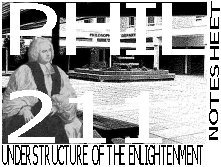 Descartes 2
Descartes 2  Descartes 2
Descartes 2 '... if I convinced myself of something then I certainly existed'. Cottingham, p.80
Certainty that I myself exist thus survives even the thought of the evil demon, which demolishes everything else. Even on that hypothesis, 'I too undoubtedly exist', even 'if he is deceiving me; and let him deceive me as much as he can, he will never bring it about that I am nothing so long as I think that I am something.' Cottingham, p.80
'So after considering everything very thoroughly, I must finally conclude that this proposition, I am, I exist, is necessarily true whenever it is put forward by me or conceived in my mind.' Cottingham, p80
(All these quotes are from the 2nd meditation.)
From the Discourse on Method:
'... I noticed that while I was endeavouring ... to think that everything was false, it was necessary that I, who was thinking this, was something. And observing that this truth 'I am thinking, therefore I exist' was so firm and sure that all the most extravagant suppositions of the sceptics were incapable of shaking it, I decided that I could accept it without scruple as the first principle of the philosophy I was seeking.' Discourse; Cottingham, p. 36.
What can this 'I' can mean?
It must refer to ' the attributes ... assigned to the soul' . Cottingham, p.81
Nutrition ? Movement?
No, they serve the body.
Sense-perception?
No - '...this surely does not occur without a body'. Cottingham, p.82
Thought, however, does. 'I am, I exist - that is certain. But for how long? For as long as I am thinking ...' Cottingham, p.82.
This is what he thinks the 'I' must mean in the bedrock certainty 'I exist'.
'I am, then, in the strict sense only a thing that thinks.' Cottingham, p.82.
"By studying the idea of God, Descartes comes to the conclusion that
'He cannot be a deceiver, since the light of nature teaches us that fraud and
deception necessarily proceed from some defect.' From this principle he later
proves the validity of mathematics and the external world." Kenny, p.145.
The idea of God is as clear and distinct as the Cogito.
Therefore I can be as certain that God exists as I can that I myself exist.
After proving the existence of myself as a thinking being, says Descartes:
'... I considered in general what is required of a proposition in order for it to be true and certain; for since I had just found one that I knew to be such, I thought that I ought also to know what this certainty consists in. I observed that there is nothing at all in the proposition, ' I am thinking, therefore I exist' to assure me that I am speaking the truth, except that I see very clearly that in order to think it is necessary to exist. So I decided that I could take it as a general rule that the things we conceive very clearly and very distinctly are all true; only there is some difficulty in recognizing which are the things that we distinctly conceive.' Discourse, Part IV, Cottingham p. 36.
However, you can also discern two quite distinct arguments for the existence of God:
'Since, then, we have within us the idea of God, or a supreme being, we may
rightly enquire into the cause of our possession of this idea. Now we find in
the idea such immeasurable greatness that we are quite certain that it could
have been placed in us only by something which truly possesses the sum of all
perfections, that is, by a God who truly exists.'
Descartes, Principles, p.166. Cottingham p.166.
Response:
We don't have the idea of God. (Hobbes, Gassendi)
Hobbes said we couldn't form an idea of God because we couldn't form an image of God. Descartes said an idea is not an image.
What is an idea for Descartes?
Gassendi: a finite intellect was incapable of conceiving of the infinite.
Development of Descartes' argument.
Descartes takes the idea to be this: the idea of a supreme, perfect, eternal, omniscient, almighty creator.
How does he establish that have the idea of God?
Kenny's formulation
I am in doubt about some things.
I lack at least one perfection.
I am not altogether perfect.
I know I am not altogether perfect.
I know what 'not altogether perfect' means.
I know what 'altogether perfect' means.
I have an idea of absolute perfection, that is, of God.
Arguments for thesis that God must be origin of this idea:
'Nothing comes from nothing' - ex nihilo nihil fit .
A thing can only come from something as or more perfect than it is itself.
'There must be at least as much reality in the efficient and total cause as in its effect.'
'I saw quite clearly that, assuming a triangle, its three angles must be equal
to two right angles; but for all that I saw nothing that would assure me that
there was any triangle in the real world. On the other hand, going back to my
examination of my idea of a perfect being, I found that this included the existence
of such a being; In the same way as the idea of a triangle includes the equality
of its three angles to two right angles, or the idea of a sphere includes the
equidistance of all parts (of its surface) from the centre; or indeed in an
even more evident way. Consequently it is at least as certain that God, the
perfect being in question, is or exists, as any proof in geometry can be.' Discourse
Part IV; Cottingham p. 38. (But I get the translation here from Kenny p.146.)